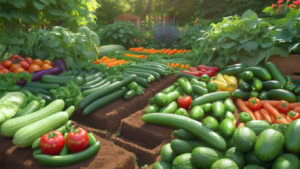
Gardening is a delightful hobby, but it requires a bit of knowledge to ensure your plants thrive. One crucial aspect to consider is which vegetables should not be planted together. This practice, known as companion planting, can significantly impact the health and yield of your garden. Here are some combinations to avoid:
- Tomatoes and Corn: Both tomatoes and corn are susceptible to the corn earworm, also known as the tomato fruitworm. Planting them together can lead to a significant pest problem, as these insects can easily transfer from one plant to another, potentially ruining both crops.
- Carrots and Dill: Dill can stunt the growth of carrots. Additionally, while dill is young, it can enhance the growth of your carrots, but as it matures, it can inhibit their development. To avoid this conflicting relationship, it’s best to keep these two plants separate.
- Onions and Peas/Beans: Onions, along with other members of the allium family such as garlic and leeks, can hinder the growth of peas and beans. These legumes require different soil conditions and nutrients, and onions can impede their development, leading to poor yields.
- Cucumbers and Potatoes: Both cucumbers and potatoes are prone to blight, and planting them together can exacerbate the problem. Additionally, potatoes can stunt the growth of cucumbers, making it harder for them to thrive.
- Broccoli and Strawberries: Broccoli and strawberries compete for the same nutrients in the soil. Planting them together can lead to nutrient deficiencies, adversely affecting both plants. It’s better to plant them in different areas of your garden to ensure they both have access to the nutrients they need.
Understanding these incompatible combinations can help you plan a more productive and healthy garden. By avoiding these pairings, you can reduce the risk of pest infestations and nutrient deficiencies, leading to a bountiful harvest. Happy gardening!
What Vegetables Should Not Be Planted Together? Gardening is a delightful hobby, but it requires a bit of knowledge to ensure your plants thrive. One crucial aspect to consider is which vegetables should not be planted together. This practice, known as companion planting, can significantly impact the health and yield of your garden. Here are some combinations to avoid: Tomatoes and Corn: Both tomatoes and corn are susceptible to the corn earworm, also known as the tomato fruitworm. Planting them together can lead to a significant pest problem, as these insects can easily transfer from one plant to another, potentially ruining both crops. Carrots and Dill: Dill can stunt the growth of carrots. Additionally, while dill is young, it can enhance the growth of your carrots, but as it matures, it can inhibit their development. To avoid this conflicting relationship, it’s best to keep these two plants separate. Onions and Peas/Beans: Onions, along with other members of the allium family such as garlic and leeks, can hinder the growth of peas and beans. These legumes require different soil conditions and nutrients, and onions can impede their development, leading to poor yields. Cucumbers and Potatoes: Both cucumbers and potatoes are prone to blight, and planting them together can exacerbate the problem. Additionally, potatoes can stunt the growth of cucumbers, making it harder for them to thrive. Broccoli and Strawberries: Broccoli and strawberries compete for the same nutrients in the soil. Planting them together can lead to nutrient deficiencies, adversely affecting both plants. It’s better to plant them in different areas of your garden to ensure they both have access to the nutrients they need. Understanding these incompatible combinations can help you plan a more productive and healthy garden. By avoiding these pairings, you can reduce the risk of pest infestations and nutrient deficiencies, leading to a bountiful harvest. Happy gardening!
